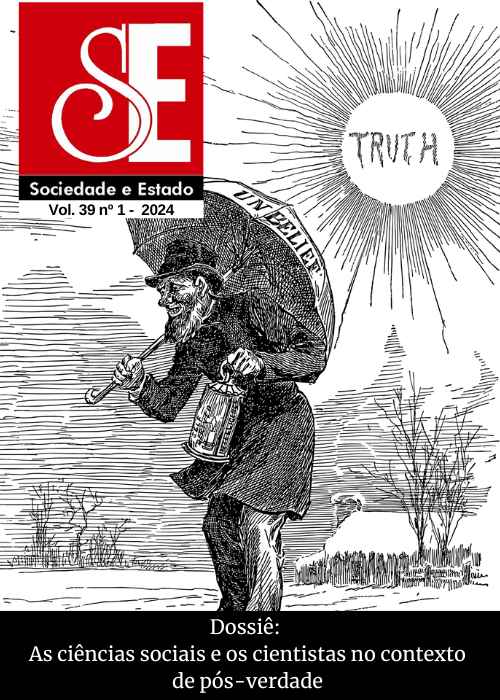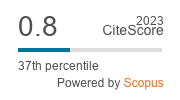O Sistema Teórico do Socialismo com Características Chinesas: Desenvolvimento como base ideológica dos pensamentos de líderes do Partido Comunista da China
DOI:
https://doi.org/10.1590/s0102-6992-20243901e47665Palavras-chave:
China, Partido Comunista da China, desenvolvimento, ideologia, líderes chinesesResumo
Registrados nas constituições do Partido Comunista da China e da República Popular da China, os pensamentos dos líderes centrais são referência para discursos de figuras políticas e estudados em todo o país. Imbuídos de um intuito modernizador, o conceito de desenvolvimento é revisitado por cada secretário-geral e constitui a base do arcabouço ideológico do partido, suscitando a pergunta do artigo: De que forma o conceito de desenvolvimento é explorado na construção de um discurso ideológico que fundamenta os pensamentos dos líderes chineses? Partindo da análise de discursos e documentos, o artigo examina o "pensamento de Mao Zedong”, a "teoria de Deng Xiaoping”, as “Três Representações” de Jiang Zemin, a “Perspectiva Científica sobre o Desenvolvimento” de Hu Jintao, e o “Socialismo com Características Chinesas para uma Nova Era” de Xi Jinping, buscando compreender como o conceito de desenvolvimento é adaptado, dependendo da conjuntura política, econômica e social da China.
Downloads
Referências
BROWN, Kerry. “The Communist Party of China and Ideology”. China: An International Journal, v. 10, n. 2, pp. 52-68, 2012.
BROWN, Kerry. CEO, China: The Rise of Xi Jinping. London: I.B.Tauris & Co. Ltd., 2016.
BROWN, Kerry. China’s Dream: The Culture of Chinese Communism and the Secret Sources of Its Power. Cambridge: Polity, 2018.
CHANG, Maria H. “The Thought of Deng Xiaoping”. Communist and Post-Communist Studies, v. 29, n. 4, pp. 377-394, 1996.
CHINA DAILY. Xi Stresses Comprehensively Raising Peaceful China Levels. Beijing, 11 nov. 2020. Disponível em: <https://www.chinadaily.com.cn/a/202011/11/WS5fab6f56a31024ad0ba936e0.html>. Acesso em: 11 nov. 2020.
» https://www.chinadaily.com.cn/a/202011/11/WS5fab6f56a31024ad0ba936e0.html
CHINA VIEW. CPC promotes "core value system" to lay moral foundation for social harmony. Beijing, 18 out. 2006. Disponível em: <https://web.archive.org/web/20080303120342/http://news3.xinhuanet.com/english/2006-10/18/content_5220576.htm>. Acesso em: 23 dez. 2020.
DENG Xiaoping. “Uphold the Four Cardinal Principles”, in: DENG Xiaoping. Selected Works of Deng Xiaoping, v. II, 1975-1982. eBook. Beijing: Foreign Languages Press, 1979.
DENG Xiaoping. “Speech at the Third Plenary Session of the Central Advisory Commission of the Communist Party of China”, in: DENG Xiaoping. Selected Works of Deng Xiaoping, v. III, 1982-1992. eBook. Beijing: Foreign Languages Press, 1984.
DENG Xiaoping. “We Should Draw on the Experience of Other Countries”, in: DENG Xiaoping. Selected Works of Deng Xiaoping, v. III, 1982-1992. eBook. Beijing: Foreign Languages Press, 1988a.
DENG Xiaoping. “Science and Technology Constitute a Primary Productive Force”, in: DENG Xiaoping. Selected Works of Deng Xiaoping, v. III, 1982-1992. eBook. Beijing: Foreign Languages Press, 1988b.
DENG Xiaoping. "Seize the Opportunity to Develop the Economy”, in: Deng Xiaoping. Selected Works of Deng Xiaoping, v. III, 1982-1992. eBook. Beijing: Foreign Languages Press, 1990.
ENGELS, Friedrich. Anti-Dühring: A Revolução da Ciência Segundo o Senhor Eugen Dühring. São Paulo: Boitempo Editorial, 2015.
EWING, Richard D. “Hu Jintao: The Making of a Chinese General Secretary”. The China Quarterly, v. 173, pp. 17-34, 2003.
FEWSMITH, Joseph. China Since Tiananmen: From Deng Xiaoping to Hu Jintao. Cambridge: Harvard University Press, 2008.
GLAWE, Linda; WAGNER, Helmut. “The Middle-Income Trap: Definitions, Theories and Countries Concerned - A Literature Survey”. Comparative Economic Studies, v. 58, n.4, pp. 507-538, 2016.
GOW, Michael. “The Core Socialist Values of the Chinese Dream: Towards a Chinese Integral State”. Critical Asian Studies, pp. 1-25, 2016.
HENDLER, Bruno. “A Projeção Internacional da China desde 2018: Os Investimentos Externos Diretos Através da Rota da Seta e Novas Relações de Centro-Periferia”. Revista da Escola de Guerra Naval, v. 25, n. 2, p. 416-448, 2019.
HU, Angang; TANG Xiao; YAN Yilong. Xi Jinping’s New Development Philosophy. Singapore: Springer, 2018.
JABBOUR, Elias; GABRIELE, Alberto. China: Socialismo do Século XXI. São Paulo: Boitempo, 2021.
JIANG Zemin. Hold High the Great Banner of Deng Xiaoping Theory for an All-round Advancement of the Cause of Building Socialism with Chinese Characteristics’ Into the 21st Century. Report Delivered at the 15th National Congress of the Communist Party of China on September 12, 1997. Disponível em: <http://www.bjreview.com.cn/document/txt/2011-03/25/content_363499_4.htm>. Acesso em: 3 dez. 2020.
» http://www.bjreview.com.cn/document/txt/2011-03/25/content_363499_4.htm
JIANG Zemin. “How Our Party is to Attain the ‘Three Represents’ Under the New Historical Conditions”, in: JIANG Zemin. On the “Three Represents”. Beijing: Foreign Languages Press, pp. 7-13, 2000.
JIANG Zemin. “Speech at the Rally in Celebration of the 80th Aniversary of the Founding of the Communist Party of China”, in: JIANG Zemin. On the “Three Represents”. Beijing: Foreign Languages Press, pp. 172-219, 2001
LI, Cheng. Chinese Politics in the Xi Jinping Era: Reassessing Collective Leadership. Washington: Brookings Institution Press. Edição do Kindle, 2016.
MAO Zedong. “On Contradiction”, in: MAO Zedong. Selected Works of Mao Tse-tung, v. I. Beijing: Foreign Language Press, pp. 311-347, 1937.
MAO Zedong. “The Youth League in Its Work Must Take the Characteristics of Youth Into Consideration”, in: MAO Zedong. Selected Works of Mao Tse-tung, v. 5. Beijing: Foreign Language Press, pp. 95-100, 1953.
MOHANTY, Manoranjan. “The New Ideological Banner: Deng Xiaoping Theory”. China Report, v. 34, n. 1, pp. 101-105, 1998.
MORAIS, Isabela N. De. Desenvolvimento Econômico, Distribuição de Renda e Pobreza na China Contemporânea. Tese de Doutorado: Instituto de Economia - UFRJ, 2011.
NAUGHTON, Barry; TSAI, Kellee S. (Org.). State Capitalism, Institutional Adaptation, and the Chinese Miracle. Cambridge: Cambridge University Press, 2015.
PCCh. Resolution on Certain Questions in the History of Our Party since the Founding of the People’s Republic of China. History and Public Policy Program Digital Archive, 1981. Disponível em: <https://digitalarchive.wilsoncenter.org/document/121344.pdf?v=d461ad5001da989b8f96cc1dfb3c8ce7>. Acesso em: 6 nov. 2020.
» https://digitalarchive.wilsoncenter.org/document/121344.pdf?v=d461ad5001da989b8f96cc1dfb3c8ce7
PCCh. Communique of the Sixth Plenum of the 16th CPC Central Committee, 2006. Disponível em: <http://www.chinese-embassy.org.uk/eng/xw/t279526.htm>. Acesso em: 23 dez. 2020.
» http://www.chinese-embassy.org.uk/eng/xw/t279526.htm
PCCh. Scientific development inscribed in CPC Constitution, 2007. Disponível em: <http://en.people.cn/90002/92169/92187/6287644.html>. Acesso em: 23 dez. 2020.
» http://en.people.cn/90002/92169/92187/6287644.html
PCCh. Scientific Outlook on Development becomes CPC theoretical guidance, 2012. Disponível em: <http://www.china.org.cn/china/18th_cpc_congress/2012-11/08/content_27041783.htm>. Acesso em: 23 dez. 2020.
» http://www.china.org.cn/china/18th_cpc_congress/2012-11/08/content_27041783.htm
PCCh. Scientific Outlook on Development, 2020a. Disponível em: <http://cpcchina.chinadaily.com.cn/2010-09/08/content_13918103.htm>. Acesso em: 20 dez. 2020.
» http://cpcchina.chinadaily.com.cn/2010-09/08/content_13918103.htm
PCCh. Harmonious Society, 2020b. Disponível em: <http://cpcchina.chinadaily.com.cn/2010-09/16/content_13918117.htm>. Acesso em: 22 dez. 2020.
» http://cpcchina.chinadaily.com.cn/2010-09/16/content_13918117.htm
PEPPER, Suzanne. “Education”, in: MACFARQUHAR, Roderick; FAIRBANK, John K. The Cambridge History of China, v. 15, The People’s Republic, Part 2: Revolutions within the Chinese Revolution (1966-1982), Cambridge: Cambridge University Press, pp. 540-593, 2008.
ROMANN, Alfred. “China’s Success Build on Party Leadership”. China Daily, Vancouver, 1 jul. 2021. Disponível em: <https://global.chinadaily.com.cn/a/202107/01/WS60dd160ca310efa1bd65f15c.html>. Acesso em: 1 jul. 2021.
» https://global.chinadaily.com.cn/a/202107/01/WS60dd160ca310efa1bd65f15c.html
RPC. Cultural Protection and Development in Xinjiang. The State Council Information Office of the People’s Republic of China, 2018. Disponível em: <http://english.www.gov.cn/archive/white_paper/2018/11/15/content_281476391524846.htm>. Acesso em: 13 jan. 2020.
» http://english.www.gov.cn/archive/white_paper/2018/11/15/content_281476391524846.htm
SAICH, Tony. “The Fourteenth Party Congress: A Programme for Authoritarian Rule”. The China Quarterly, n. 132, pp. 1136-1160, 1992.
VADELL, Javier; SECCHES, Daniela; BURGER, Mariana. “De la globalización a la interconectividad: reconfiguración espacial en la iniciativa Belt & Road e implicaciones para el Sur Global”. Revista Transporte Y Territorio, n. 21, pp. 44-68, 2019.
VIEIRA, Victor C. C. “A Humilhação Nacional como Instrumento de Construção da Identidade e da Estabilidade Política na China”. Diálogos, v. 22, n. 3, pp. 128-148, 2018.
VIEIRA, Victor C. C. “From Third World Theory to Belt and Road Initiative: International Aid as a Chinese Foreign Policy Tool”. Contexto Internacional, v. 4, n. 3, pp. 529-551, 2019.
WANG Hui. The End of the Revolution: China and the Limits of Modernity. London: Verso, 2011.
WANG, Zhenbo; LIU, Haimeng. “Beautiful China Initiative: Human-nature harmony theory, evaluation index system and application”. Journal od Geographical Sciences, pp. 691-704, 2020.
WU, Vivian. “The ‘Eight Immortals’ Who Jockeyed for Control of a Nation”. South China Morning Post, 2008. Disponível em: <https://www.scmp.com/article/662093/eight-immortals-who-jockeyed-control-nation>. Acesso em: 5 mar. 2019.
» https://www.scmp.com/article/662093/eight-immortals-who-jockeyed-control-nation
XI Jinping. “A Grande Revitalização da Nação é o Maior Sonho do Povo Chinês”, in: XI Jinping. A Governança da China I. Rio de Janeiro: Contraponto, pp. 41-43, 2012.
XI Jinping. “Discurso na 1ª Sessão da 12ª Assembleia Popular Nacional”, in: XI Jinping. A Governança da China I. Rio de Janeiro: Contraponto, pp. 44-51, 2013.
XI Jinping. “Promover as “Quatro Disposições Estratégicas Integrais”, in: XI Jinping. A Governança da China II. Rio de Janeiro: Contraponto, pp. 24-31, 2014a.
XI Jinping. “O Trabalho Econômico Deve se Adaptar à Nova Normalidade”, in: XI Jinping. A Governança da China II. Rio de Janeiro: Contraponto, pp. 279-287, 2014b.
XI Jinping. How to Deepen Reform Comprehensively. Beijing: Foreign Languages Press, 2014c.
XI Jinping. “Orientar o Desenvolvimento com Novos Conceitos”, in: XI Jinping. A Governança da China II. Rio de Janeiro: Contraponto, pp. 239-243, 2015a.
XI Jinping. “Entender a Situação da Fase Decisiva para Alcançar a Primeira Meta Centenária”, in: XI Jinping. A Governança da China II. Rio de Janeiro: Contraponto, pp. 81-84, 2015b.
XI Jinping. “A Iniciativa “Cinturão e Rota” Beneficia o Povo”, in: XI Jinping. A Governança da China II. Rio de Janeiro: Contraponto, pp. 618-621, 2016.
XI Jinping. “Secure a Decisive Victory in Building a Moderately Prosperous Society in All Respects and Strive for the Great Success of Socialism with Chinese Characteristics for a New Era”, in: XI Jinping. The Governance of China III. Beijing: Foreign Language Press Co. Ltd, pp. 1-79, 2017.
ZHOU Lanxu; CHENG Yu. “Dual Circulation at Heart of Economic Strategy”. China Daily, 5 mar. 2021. Disponível em: <http://global.chinadaily.com.cn/a/202103/05/WS6041835fa31024ad0baace9f_2.html>. Acesso em: 5 mar. 2021.
» http://global.chinadaily.com.cn/a/202103/05/WS6041835fa31024ad0baace9f_2.html
Downloads
Publicado
Como Citar
Edição
Seção
Licença
Copyright (c) 2024 Sociedade e Estado

Este trabalho está licenciado sob uma licença Creative Commons Attribution 4.0 International License.











